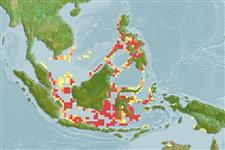>
Blenniiformes (Blennies) >
Blenniidae (Combtooth blennies) > Salariinae
Etymology: Ecsenius: Greek, exenios, -os, -on = uncontrolled, immoderate; ops: Name from the Greek word meaning eye, refers to the dark spot on the dorsoposterior margin of the orbit; noun in apposition..
Environment: milieu / climate zone / depth range / distribution range
Ecologia
marinhas demersal; intervalo de profundidade 4 - 20 m (Ref. 48636). Tropical
Western Central Pacific: Indonesia.
Tamanho / Peso / Idade
Maturity: Lm ? range ? - ? cm
Max length : 5.5 cm TL macho/indeterminado; (Ref. 48636)
Descrição suscinta
Morfologia | Morfometria
Diagnosis: a black outer ring surrounding a bright yellow ring in iris of the eye; faint to bright white stripe originating on snout below ventro-anterior margin of orbit and continuing posteriorly along ventral margin of orbit to preopercular series of pores, ending or continuing much diminished in intensity to posterior margin of opercle; pale-margined, dark spot, smaller than pupil of eye, present on post-orbital margin at about 2 o'clock position. Body more or less uniformly olive-brown or with the indications of fine, greenish yellow, stripe-like area along dorsal body contour below dorsal fin, paralleled ventrally by broad, olive-brown area grading ventrally and narrowly to greenish yellow at body midline, then abruptly whitish below (Ref. 55736).
Adults are found in clear coastal to outer reef habitats to about 20 m depth (Ref. 48636), perched on live corals in sheltered reefs (Ref. 90102). Oviparous. Eggs are demersal and adhesive (Ref. 205), and are attached to the substrate via a filamentous, adhesive pad or pedestal (Ref. 94114). Larvae are planktonic, often found in shallow, coastal waters (Ref. 94114).
Ciclo de vida ou comportamento de acasalamento
Maturidade | Reprodução | Desova | Ovos | Fecundidade | Larvas
Oviparous, distinct pairing (Ref. 205).
Springer, V.G. and G.R. Allen, 2001. Ecsenius ops, from Indonesia, and E. tricolor, from western Philippines and northwestern Kalimantan, new species of blenniid fishes in the stigmatura species group. aqua, J. Ichthyol. Aquat. Biol. 4(4):151-160. (Ref. 55736)
Status na Lista Vermelha da UICN (Ref. 130435)
Ameaça para os humanos
Harmless
Uso pelos humanos
Mais informação
Idade/TamanhoCrescimentoPeso-comprimentoComprimento-comprimentoFrequências de comprimentoMorfometriaMorfologiaLarvasDinâmica larvalRecrutamentoAbundânciaBRUVS
ReferênciasAquaculturaPerfil para aquaculturaEstirpesGenéticaElectrophoresesHereditariedadeDoençasProcessamentoNutrientsConversão de massa
ColaboradoresFotosStamps, Coins Misc.SonsCiguateraVelocidadeTipo de nataçãoÁrea branquialOtólitosCérebrosVisão
Ferramentas
Relatórios especiais
Baixar XML
Fontes da internet
Estimates based on models
Índice de diversidade filogenética (Ref.
82804): PD
50 = 0.5000 [Uniqueness, from 0.5 = low to 2.0 = high].
Bayesian length-weight: a=0.00741 (0.00335 - 0.01640), b=3.02 (2.83 - 3.21), in cm total length, based on LWR estimates for this (Sub)family-body shape (Ref.
93245).
Nível Trófico (Ref.
69278): 2.0 ±0.00 se; based on food items.
Resiliência (Ref.
120179): Elevada, tempo mínimo de duplicação da população menor que 15 meses (Preliminary K or Fecundity.).
Fishing Vulnerability (Ref.
59153): Low vulnerability (10 of 100).
Nutrients (Ref.
124155): Calcium = 666 [386, 1,600] mg/100g; Iron = 2.12 [1.19, 3.96] mg/100g; Protein = 17 [16, 18] %; Omega3 = 0.148 [0.072, 0.308] g/100g; Selenium = 40.5 [18.2, 100.9] μg/100g; VitaminA = 29.8 [7.7, 116.2] μg/100g; Zinc = 3.36 [2.20, 5.04] mg/100g (wet weight);
